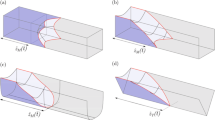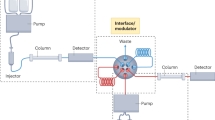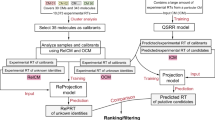Abstract
THE use of long, coated capillaries in gas-liquid partition chromatography was first suggested by A. J. P. Martin1 and was developed by M. J. E. Golay2. Compared with the conventional packed columns, coated capillaries have provided a means of obtaining very high efficiencies with comparatively small retention times. Results that have so far been published3 have been obtained from capillaries constructed from metal or glass (Desty, D. H., unpublished work).
This is a preview of subscription content, access via your institution
Access options
Subscribe to this journal
Receive 51 print issues and online access
$199.00 per year
only $3.90 per issue
Buy this article
- Purchase on SpringerLink
- Instant access to full article PDF
Prices may be subject to local taxes which are calculated during checkout
Similar content being viewed by others
References
Martin, A. J. P., in “Vapour Phase Chromatography”, 2, edit. by Desty, D. H. (1957).
Golay, M. J. E., in “Gas Chromatography”, 1, edit. by Coates, Noebels and Fagerson (1957); in “Vapour Phase Chromatography”, 36, edit by Desty, D. H. (1957).
Dijkstra, G., and de Goey, J., in “Gas Chromatography”, 56, edit. by Desty, D. H. (1958). Desty, D. H., Nature, 183, 107 (1959). Lovelock, J. E., and Zlatkis, A., Anal. Chem., 620 (1959).
Author information
Authors and Affiliations
Rights and permissions
About this article
Cite this article
SCOTT, R. Nylon Capillary Columns for use in Gas-Liquid Chromatography. Nature 183, 1753–1754 (1959). https://doi.org/10.1038/1831753a0
Issue date:
DOI: https://doi.org/10.1038/1831753a0
This article is cited by
-
Open-tubular columns: Past, present and future
Chromatographia (1992)
-
Performance of open tubular columns as a function of tube diameter and liquid phase film thickness
Chromatographia (1984)
-
Capillary columns-from London to London in 25 years
Chromatographia (1982)
-
Preparation of high resolution nickel open tubular columns
Chromatographia (1974)
-
Cathode-Ray Presentation of Chromatograms
Nature (1960)



